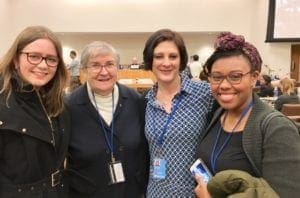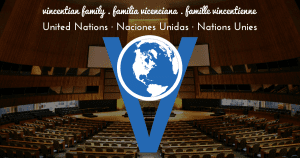Many people read extensively to stay updated on human trafficking, but feel stuck in finding practical ways to combat it. A Holy See event during the recent Commission on the Status of Women at the UN illustrated that we all can engage in addressing a key component of human trafficking—vulnerability.
The conference was entitled, “Preventing Human Trafficking among Rural Women and Girls: Integrating Inherent Dignity into a Human Rights Model.” Panelists spoke repeatedly about the links between vulnerability, human rights violations, and trafficking.
TRAFFICKED PERSONS PART OF A PROCESS OF VICTIMIZATION
“Trafficked women don’t come out of a vacuum,” said Sr. Angela Reed, RSM, Ph.D., who has engaged in research about ways to end human trafficking. “There is a process of victimization in which vulnerable women are trafficked.”
That process of seemed evident as panelist Mely Lenario related her experience in the Philippines. She learned her stepfather raped her sister, but her mother did nothing to stop it. Family did not believe her. She was placed in an orphanage and did not experience a mother’s love, she said. She remembers being angry. She had dreams of a good education and earning a decent income. Her vulnerability was evident when an elegant lady approached her with promises of employment and going to school for free. Instead of realizing a better life, she was lured into prostitution and drug use. Lenario escaped with the help of some priests and moved into a safe house run by the Congregation of Our Lady of Charity of the Good Shepherd.
“Formerly trafficked women challenge the view that being trafficked for sexual exploitation is a single isolated event in their lives. Instead they draw attention to human rights violations and systemic oppression that occur throughout their entire lives,” Sister Reed commented.
Vulnerabilities in remote areas of India were described by Sr. Annie Jesus Mary Louis, a social worker and Franciscan Missionary of Mary. She spoke of a population which has very little—a lack of money, a poor standard of education, sparse access to health care and sanitation, situated hundreds of miles from cities, with no public services, and no NGOs nearby.
TRAFFICKERS “DRESS UP EVIL IN BENEVOLENCE”
“Traffickers know all this,” said Sr. Louis. “The traffickers know parents are easily deceived and will even sell their own children. Youth are lured by promises of opportunities in cities. Traffickers dress up evil in benevolence, promising work or money.”
ONE SOLUTION– ENDING SUPPLY AND DEMAND
Quoting Pope Francis, Sr. Louis noted that if many young girls end up on the streets of the city, it is because there are men who want their services. “The true solution,” she said, echoing the words of Pope Francis, “is the conversion of hearts, cutting off the demand and drying up the market.”
INCLUDE VICTIMS IN POLICY-MAKING
Ms. Lenario called for creating opportunities for trafficked women and girls to tell their stories and to have strong input into policies which relate to trafficking. She said that they need to be able to draw attention to human right violations and systemic oppression in their lives.
FUNDING FOR FRONT LINES NEEDED
Sr. Sheila Smith, from the Society of the Sacred Heart, echoed that the human dignity of trafficked women is violated not only by trafficking, but also the exclusion they confront. She was among two panelists who also noted that funding to fight human trafficking typically is typically directed to larger organizations, rather than the advocates from smaller organizations at the front lines.
“There are a lot of obstacles: transportation, technology,” she said. “The particular women I work with, they know what is needed in their communities, but it is such a struggle to get the funds to do the work.”
EDUCATION ABOUT DANGERS IN RURAL AREAS REQUIRED
In the context of rural women and girls, around which the theme of CSW revolved, to end the availability of victims in the human trafficking supply chain means educating people in rural and vulnerable areas about signs and dangers of human traffickers. When the grass is portrayed as greener on the other side, quite often, it is not.
WE CAN RESPOND BY REDUCING VULNERABILITIES
How might the Vincentian Family respond? The answer is right in front of us–continue to reduce vulnerabilities of the most marginalized.
In addition to keeping handing the hotline which enables us to report suspicious activity in our locations, we must ask some questions. Are there other young women like Ms. Lenario who are in need of a listening ear and compassion? Are there youth in need of job skills and meaningful work? Is there a need to increase education among youth and parents alike about the signs, methods, and dangers of traffickers? Are there young people in need of food or health care? Is there a need for positive and engaging activities for youth? Are there more ways we can engage trafficking victims in telling their stories and providing input into policies? Are there efforts such as safe houses and trafficking prevention programs which need funding? Can we contact our Diocesan offices and find out who is working on trafficking in our area, set up a meeting to educate ourselves, and ask how we might help? Could we contact International Project Services in Detroit and see if an anti-trafficking program needs funding?
SOME VINCENTIAN FAMILY EFFORTS

Jenny Raw, Catherine Prendergast, and Jada Bradberry with Sarah Benson of the Ruhama Program in Ireland, which works with women affected by prostitution
Many Vincentian Family members are already engaged in such efforts. At the UN, the Daughters of Charity, Sisters of Charity Federation, and Congregation of the Mission are regular attendants at the NGO Committee to Stop Trafficking in Persons.
The Sisters of Charity of Nazareth responded to needs after an earthquake in Nepal by creating safe space for children so that their mothers could clean, repair and find necessities. In tribal areas of India, the Sisters of Charity of Nazareth raise awareness about trafficking through street plays. Youth and women’s groups serve as actors. Performers address who predators are and how one is trapped or taken. ln Kathmandu, grass roots social workers are trained to work against trafficking. They receive leadership and skills training, legal aid, tips on how to stop trafficking, and more.
In the US, Sister Michelle Loisel devotes her time exclusively to human trafficking issues and regularly spreads the word through her publication, Just Freedom. A Sister of Charity of Halifax started a network in New York to provide safe housing for trafficked women. In Australia, the Daughters of Charity support ACRATH Australian Catholic Religious Against Trafficking in Humans (ACRATH). Sisters in Venezuela, Ecuador, and Colombia (and I’m sure many other locations globally) are engaged in programs to provide education about preventing trafficking. In at least one of these programs, the Congregation of the Mission is a collaborator. And in Vietnam, the Daughters of Charity run a program to provide various skills as well as a program to fend off traffickers. I do not have a list of each place the Vincentian Family is working on trafficking. But no doubt, the Vincentian Family is quite active in anti-trafficking efforts in Africa and Europe as well.
Let’s take example from these efforts and continue to recognize the need to end inequalities and simply reach out to persons who are vulnerable.








Thank you for concrete suggestions.